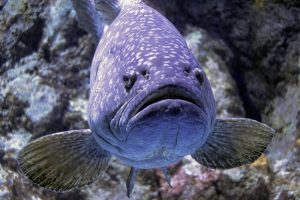Groupers are a diverse family of fish known for their large size and impressive strength. These iconic marine creatures play a vital role in their ecosystems. In this article, we will delve into the fascinating world of grouper lifespan, exploring the factors that influence their longevity and the potential health challenges they face.
Overview of Grouper Species
The grouper family encompasses a wide variety of species, each with its own unique characteristics. Some of the most well-known groupers include the Goliath Grouper, Nassau Grouper, and Tiger Grouper. These species vary in size, habitat preferences, and life histories, which can all impact their lifespan.

Average Lifespan of Groupers
While the exact lifespan of a grouper can vary depending on various factors, many species have been observed to live for several decades. For instance, the Goliath Grouper, one of the largest fish in the Atlantic Ocean, can reach an age of 30 to 50 years. Other species, such as the Nassau Grouper, may have shorter lifespans of around 20 to 30 years.
Several factors contribute to the lifespan of groupers. Environment plays a crucial role, as healthy coral reefs and abundant food sources can support longer lifespans. Fishing pressure can significantly impact grouper populations, as overfishing can reduce their numbers and limit their ability to reproduce. Additionally, diet can influence longevity, as a balanced diet provides essential nutrients for growth and survival.
Factors Influencing Grouper Lifespan
The lifespan of groupers is influenced by various factors, both natural and human-made:
- Natural Predators: Although adult groupers have few predators due to their size, juveniles are vulnerable to larger fish and sharks, which can reduce their numbers before they reach maturity.
- Human Impact: Overfishing is a significant threat to grouper populations. The slow reproductive rates of many grouper species make it difficult for them to recover from heavy fishing pressure. Additionally, habitat destruction due to coastal development and pollution has impacted their natural environments, limiting their ability to thrive.
- Diet and Habitat: Groupers rely on healthy coral reefs, rocky ledges, and other underwater structures for shelter and feeding. A balanced diet of smaller fish, crustaceans, and invertebrates is essential for their growth and longevity. A decline in these food sources or habitat degradation can shorten their lifespan.
Health Problems in Groupers
Groupers, like other fish species, can be susceptible to various health problems. Common issues include infections, gill diseases, and parasites. These health challenges can be exacerbated by environmental stressors such as temperature changes, pollution, and poor water quality.
Do Groupers Have Health Problems
Groupers, like other marine species, can suffer from health issues that can shorten their lifespan:
- Parasites and Infections: Groupers are susceptible to parasites such as nematodes and copepods. These parasites can affect their gills, skin, and intestines, weakening the fish over time.
- Gill and Fin Rot: Poor water quality, including pollution and temperature fluctuations, can lead to gill or fin rot, a condition that causes tissue damage and hinders the fish’s ability to breathe or move efficiently.
- Environmental Stress: Groupers are sensitive to changes in water temperature. Sudden shifts can lead to stress, making them more vulnerable to disease.
In summary, while groupers can live for several decades, they do face health challenges. Addressing the question Do grouper have health problems?—the answer is yes, but these are often related to environmental factors and human activity.
Conservation and Protection Efforts
To safeguard grouper populations and their long-term survival, numerous conservation efforts are underway. These initiatives focus on reducing overfishing, protecting critical habitats, and promoting sustainable fishing practices. By implementing effective conservation measures, we can help to improve grouper health and extend their lifespans.

Grouper species exhibit a wide range of lifespans, with many individuals living for several decades. Their longevity is influenced by a complex interplay of factors, including natural predators, human activities, diet, and habitat conditions. While groupers can face health challenges, conservation efforts are essential to protect their populations and ensure their continued survival for future generations.




